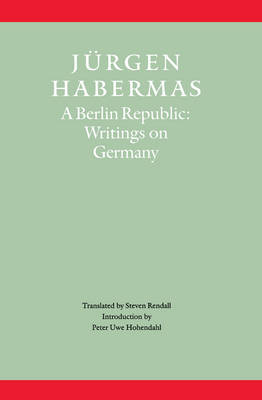
A Berlin Republic
Writings on Germany
Seiten
1997
Polity Press (Verlag)
978-0-7456-2044-2 (ISBN)
Polity Press (Verlag)
978-0-7456-2044-2 (ISBN)
- Titel z.Zt. nicht lieferbar
- Versandkostenfrei
- Auch auf Rechnung
- Artikel merken
aeo A new book by Habermas which examines recent German history and some of the political challenges facing Europe today aeo Addresses the legacy of anti--semitism both in Germany and throughout Europe aeo Develops an original argument for the growing significance of transnational and global democratic institutions.
A Berlin Republic brings together writings on the new, united Germany by one of their most original and trenchant commentators, Jürgen Habermas. Among other topics, he addresses the consequences of German history, the challenges and perils of the post-Wall era, and Germany's place in contemporary Europe. Here, as in his earlier The Past as Future, Habermas emerges as an inspired analyst of contemporary German political and intellectual life. He repeatedly criticizes recent efforts by historical and political commentators to 'normalize' and, in part, to understate the horrors of modern German history. He insists that 1945 - not 1989 - was the crucial turning point in German history, since it was then that West Germany decisively repudiated certain aspects of its cultural and political past (nationalism and antisemitism in particular) and turned towards Western Traditions of democracy: free and open discussion, and respect for the civil rights of all individuals. Similarly, Habermas deplores the renewal of nationalist sentiment in Germany and throughout Europe. Drawing upon his vast historical knowledge and contemporary insight, Habermas argues for heightened emphasis on trans-European and global democratic institutions - institutions far better suited to meet the challenges (and dangers) of the next century.
A Berlin Republic brings together writings on the new, united Germany by one of their most original and trenchant commentators, Jürgen Habermas. Among other topics, he addresses the consequences of German history, the challenges and perils of the post-Wall era, and Germany's place in contemporary Europe. Here, as in his earlier The Past as Future, Habermas emerges as an inspired analyst of contemporary German political and intellectual life. He repeatedly criticizes recent efforts by historical and political commentators to 'normalize' and, in part, to understate the horrors of modern German history. He insists that 1945 - not 1989 - was the crucial turning point in German history, since it was then that West Germany decisively repudiated certain aspects of its cultural and political past (nationalism and antisemitism in particular) and turned towards Western Traditions of democracy: free and open discussion, and respect for the civil rights of all individuals. Similarly, Habermas deplores the renewal of nationalist sentiment in Germany and throughout Europe. Drawing upon his vast historical knowledge and contemporary insight, Habermas argues for heightened emphasis on trans-European and global democratic institutions - institutions far better suited to meet the challenges (and dangers) of the next century.
Jürgen Habermas is a German philosopher and sociologist in the tradition of critical theory and pragmatism. He is perhaps best known for his theories on communicative rationality and the public sphere. In 2014, Prospect readers chose Habermas as one of their favourites among the "world's leading thinkers". Steven Rendall is professor emeritus of romance languages at the University of Oregon. He has translated more than forty books into English.
1. Can We Learn From History? 2. A Double Past.
3. German Uncertainties.
4. The Need for German Continuities.
5. Between Facts and Norms.
6. Which History Can We Learn From?
Index.
| Erscheint lt. Verlag | 21.12.1997 |
|---|---|
| Einführung | Peter Uwe Hobendahl |
| Übersetzer | Steven Rendall |
| Verlagsort | Oxford |
| Sprache | englisch |
| Maße | 134 x 227 mm |
| Gewicht | 397 g |
| Themenwelt | Geschichte ► Allgemeine Geschichte ► Zeitgeschichte |
| Geisteswissenschaften ► Geschichte ► Regional- / Ländergeschichte | |
| ISBN-10 | 0-7456-2044-2 / 0745620442 |
| ISBN-13 | 978-0-7456-2044-2 / 9780745620442 |
| Zustand | Neuware |
| Informationen gemäß Produktsicherheitsverordnung (GPSR) | |
| Haben Sie eine Frage zum Produkt? |
Mehr entdecken
aus dem Bereich
aus dem Bereich
Gewalt, Umwelt, Identität, Methode
Buch | Softcover (2024)
Spector Books OHG (Verlag)
CHF 49,95


